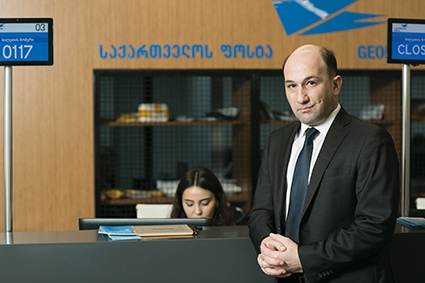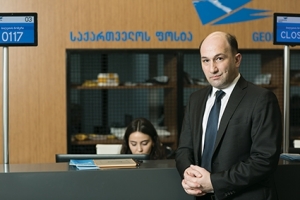Georgian Post: Delivering the Best
Exclusive Interview
Levan Chikvaidze, General Director of Georgian Post: “While I was living in the United States, I needed to get some documents notarized. First, I had to send these to be signed by the Governor of the State of California- who at that time happened to be Arnold Schwarzenegger. It took some two weeks to get everything together. Then I sent it quite confidently via USPS to a Georgian address. Two months later, the Georgian post office told me they had found my documents, but they had got wet and so were unusable. And so I had to start again…”
Not an unfamiliar story for those who have been living here a while. And with 11 years living here under my own belt, I can well sympathize the dark, dingy, post-civil war conditions Levan Chikvaidze met when he came to his position in 2012. With a big international postal forum coming up next week, GEORGIA TODAY sat down with the man to find out more about the past, present and future of the company.
“I knew nothing about the postal service when I took up my position at the end of 2012, having come from the Parliament of Georgia. I lived and worked in the United States and could claim to be no more than a customer [of the Georgian postal service] before I took on the role of General Director. In fact, one could say there was no postal service. We had a lot of courier companies and franchises but no designated general operator. What I found when I came was a service without an operational system, governmental support or infrastructure run by staff without hope or motivation- earning only 50 GEL per month.”
When he started, Chikvaidze began by addressing the European postal services, seeking opportunities to share experience of operation, commercialization and, ultimately, privatization- and they had over 20 years of it to share with Georgia.
“The PostEurop community is an association with 52 Designated Operators , 49 of whm are member countries,” he told us. “In most countries, the universal postal service is subsidized by the government. In the EU, the member countries have been working since the 1990s to move away from this format. Post is not a classical business but is well able to be run by the private sector. So far, full privatization has been achieved by very few countries in Europe. Deutsch Post still has 20% of its shares owned by the government, even though buying out DHL made it the strongest of its kind in Europe, as does Royal Mail in the UK. Privatization allows for greater flexibility in business. Georgian Post is 100% state-owned but it is our plan to work in the same direction, using the European experience to guide us.”
Georgian Post has been a member of the Post Europe (PE) community since Chikvaidze came aboard.
“The first thing they did was to allocate three experts to come and analyze our postal service and provide recommendations. They gave us a road map of what to do, and a two-year deadline. It was an eye-opener for us. A year-and-a-half and a huge amount of restructuring later, we invited them back and they gave us the title of ‘Fastest developed designated operator.’ From there on in, we’ve kept up frequent communication.”
We asked Chikvaidze what the most challenging apect had been to change as part of the rehaul, and he named the operational system, “because there was none,” he said. “We had to work on both quality and technology. IT solutions were a must, especially with us becoming part of the global IPS program (track-and-trace) in 2013- 2014. Georgian Post is part of the world’s postal chain and we all worked really hard to get to the required level.”
Staffing was also an issue that needed to be dealt with and, in what many at the time considered a brutal manner, but which ultimately was a sacrifice that needed to be made, Georgian Post made large numbers of its employees redundant. “It was hard,” Chikvaidze admits, “but I was looking for Georgia’s most talented individuals to join us- in IT solutions, for example, where today we have one of the best crews. At the beginning, I took on three IT experts and then looked for students to be trained by them. As such, many young people have grown up as part of the Georgian Post family. The Europeans stood by us, providing experience.”
LEADERS IN THE REGION
Chikvaidze tells us that in Q1 2018, Georgian Post was the 10th country in quality of service in Europe. In Q2 - Q3, it was second in the world for quality and delivery of Express Mail Services (EMS), second after Singapore but first in Europe.
“It was an astounding achievement and makes all of us at Georgian Post feel proud. I’m thankful to each employee for their incredibly hard work- it was a success that they actively sought.”
The geographical location of Georgia puts it in an ideal position to serve as a hub for transit post, as indeed it has been doing since Medieval times when couriers and messengers carried news across the country (source: The Georgian Chronicles ‘Kartlis Tskhovreba’).
“We’re working on capacity development with transit postal items flowing from China to Europe and the US. Georgia has huge potential in this regard. Our location also gives us an advantage with regards e-commerce, our next big direction.”
He tells us about Maleo, an electronic platform intended to enable the receipt of e-commerce packages from the United States in Georgia, such as items ordered through amazon or ebay.
“Any adult resident of Georgia can open a postal address in the US and Georgian Post will ensure transportation of the e-commerce packages received at this address to Georgia and its delivery to the client wherever he may be in the country.”
“‘Georgian Product to the World’ is another new project as part of Georgian Post’s commitment to promoting local businesses and entrepreneurs by enabling them to export their produce through us,” Chikvaidze says. “The online market is the biggest market. The first company joined the platform two days ago and already sold 49 products to be sent abroad.”
The electronic platform Georgian Product to the World enables local manufacturers to sell products via web-pages and have them delivered to customers through Georgian Post not only within Georgia but also abroad. The manufacturer concludes an agreement with Georgian Post entitling them to integrate the company API module with his/her own electronic shopping page. This allows customers to select shipping options, insure their package(s) and/or track movement of the products all the way from its purchase to its delivery.
“We’re working with our 192 partner countries, a global chain working through Georgia, to deliver this service,” Chikvaidze notes. “We aim to improve quality and availability along with the government plans for the full internetization of the country. When a new village is put online, we’re there to offer our postal and e-commerce services. We have 82 service centers countrywide.”
THE FORUM
The October 4 PostEurop Business Innovation Forum and Postal Startup Summit will be showcasing some of the most successful start-ups working with postal operators in 49 EU countries in the areas of the Internet of Things, Digital Advertising, E-Commerce, Automation, Robotics and Artificial Intelligence.
“The decision to hold the Forum and Summit in Tbilisi was made in 2015 following on from our successful overhaul,” Chikvaidze says. “We’re very excited to have such large companies and their head representatives coming. The Director General of the Universal Postal Service will be here with his deputy, as will the Head of the African Association of Postal Designated Operators- 54 of them in total, and management of PostEurop. On the second day we’ll have a business forum, up to 100 companies have already registered which work in the postal service or innovations. These 100 international and local companies have the chance to introduce each other to their products and services, making it an ideal opportunity for Georgian businesses working in digital innovations and Artificial Intelligence to meet the top operators in the field, through panels discussions and B2B meetings.”
THE BIGGEST ACHIEVEMENT
We asked Chikvaidze what he felt his biggest achievement had been in the past six years.
“The Universal Postal Union has two councils: the Postal Operation Council and the Council of Administration. I encouraged the state, the Ministry of Economy, to apply for membership and we won the elections with 108 votes in 2016 to become members of both councils and Vice-Chairman of the Council of Administration, meaning we are involved in international law-making in this area. We expected no more than 23 votes but with a bit of work and a bit of luck, we beat the 90-vote benchmark – something that meant a great deal in my life and in the lives of our employees. I’m happy when I see the happy faces of my employees, this is not only because the average salary comes in at 876 GEL now, but because they are part of a successful and growing business serving the local and global community and economy.”
ABOUT GEORGIAN POST
Georgian Post represents a leading national postal operator that is mainly involved in providing consumers with universal postal services. The company is oriented on using modern technologies that allows it to provide its clients with as fast a service as possible.
Georgian Post is a member of the UPU and PostEurop international postal unions. The latter represents the European social postal association founded in Brussels in 1993, including 52 postal operators from 49 countries. The Universal Postal Union was established in Swiss Capital Bern in 1874. Being one of the world’s oldest associations, it unites 192 countries.
Since 2015, the company rebranded, renewed its service centers, re-trained employees, created new labor standards and established innovative technologies that resulted in the Georgian Post having been recognized as a trustworthy and important partner.
The Georgian Post represents the largest postal organization in the country with a wide range of services as well as the most expanded network of service centers, 82 throughout Georgia, with 2700 highly-qualified employees.
Georgian Post carries out the following actions:
- Receiving, sending and delivering mailings (letters, parcels, postcards, print materials) within the country and internationally, through the Universal Postal Union (UPU) and the International Express Mail Service (EMS) network;
- Receiving utility service payments;
- Domestic money transfers as well as transfers towards Belgium, Turkey, Japan, Greece, Lithuania, Latvia and the CIS;
- Telegraph services within the country to rural and regional centers
By Katie Ruth Davies











